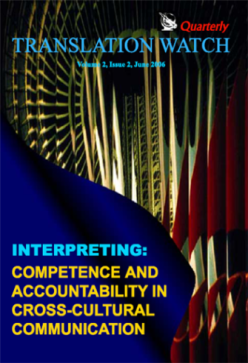|
TWQ Home | TWQ Editors | Guidelines for Authors | Guidelines for Referees | Subscription | Advertising |
In Press: The June Issue of
Translation Watch Quarterly!If you are a subscriber, you will receive it in the mail soon.
If not, subscribe today!
Volume 2, Issue 2, 2006
This special issue looks at Competence and Accountability in interpreting and translation.
IN THIS ISSUE...
Editorial
Competence and Accountability in Cross-Cultural Communication
Roger BellIn this editorial, Professor Roger Bell, Honorary Fellow of the Chartered Institute of Linguists (London), distinguished scholar in translation, linguistics and communication, and author of the authoritative book on translation Translation and Translating Theory and Practice, highlights the critical importance of competence and accountability of professional translators and interpreters, which the papers in this issue address. "Technical translators, interpreters in the media, interpreters using machine assistants in medical settings, interpreter assessors or educators, all share a common duty to those who depend on them: to strive for professional excellence in terms of both professional competence and accountability".
A Critical Analysis of the NAATI Interpreter Test in Australia
Leong KoIn this paper, Dr Leong Ko from University of Queensland provides an incisive analysis of interpreting accreditation tests and criteria. He examines issues surrounding the NAATI Interpreter test from the perspectives of the interpreting profession, relevant theories, training programs and real-life interpreting practice in the Australian context. "NAATI attaches great importance to accuracy, natural expression and interpreting skills, and that the Interpreter test reflects some of the genuine requirements in the real interpreting world. However, there are some mismatches between the expectations of the Interpreter test and the requirements of real interpreting work".
Scientific and Technical Translation Problems and Ways to Overcome Them (English to Malay)
Kulwindr Kaur a/p Gurdial SinghIn this paper, Dr Kulwindr Kaur from University of Malaya investigates the internal and external translation processes of English language scientific and technical texts to the Malay language to find out the problems faced by the translators in their translation process. The research methods used in this empirical study are think-aloud protocols (TAPs), interviews and a questionnaire. Fifty part-time translators responded to the questionnaire while five participated in the TAPs and interviews. The paper also provides suggestions for overcoming problems of scientific and technical translation.
A Web-Based Bilingual Communication Process to Facilitate Patient-Healthcare Provider Dialog in UAE and US Hospitals
Rana RaddawiIn this paper, Dr Rana Raddawi from American University of Sharjah presents a project based on a web communication process (software) which aims at facilitating dialogue between English speaking healthcare providers and non-English speaking patients taking as case study the United Arab Emirates and United States Hospitals. In addition to the researcher’s involvement as principal investigator in the translation and technical application processes, a team of doctors, nurses and linguists are also taking part in this project.
Standards of Simultaneous Interpreting in Live Satellite Broadcasts
Ali DarwishIn this paper, Ali Darwish examines the emerging standards of telecast simultaneous interpreting in satellite television and the critical role interpreter-mediated, real-time, cross-cultural and multilingual communication plays in live debates, talk shows and newscasts that seek to effect regional change through international interaction with officials, political observers, analysts and commentators.
Book Review
Conference Interpreting Explained
Conference Interpreting Explained, by Roderick Jones, sheds the light on one mode of interpreting, namely conference interpreting. Long confused with, or rather restricted to simultaneous interpreting, conference interpreting has not been given adequate attention in the literature on translation studies. There is only a handful of major publications on interpreting compared to translation. In this second edition of the book (the first was published in 1998), the author presents a practical guide to conference interpreting. As Jones explains in the foreword, the book is aimed at four groups of people: interpreting students, teachers, colleagues and the public at large.The book is rich with hints and tips derived from the author's own practical experience as a staff interpreter for one of the institutions of the European Union and his reflection on his own work. The author modestly declares, “I write only as an interpreter, not as an academic, a theorist or a researcher in the field of translation studies”, which makes the book all the more relevant to the profession.
![]()
TRANSLATION WATCH QUARTERLY
P O Box 418 Patterson Lakes, Victoria 3197
AUSTRALIA
General Enquiries
Email: transqa@surf.net.au
Copyright © 2003 - 2006 Translation Standards Institute
Designed by Writescope

